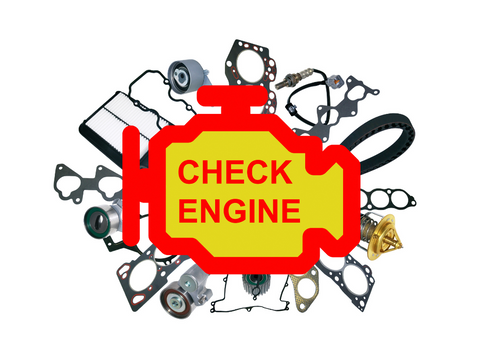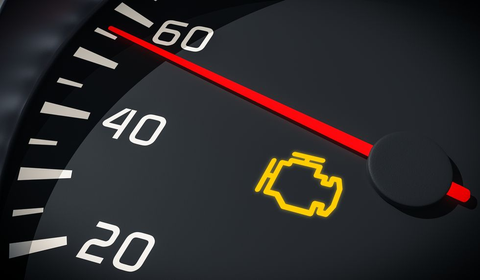Check What is Causing Your Check Engine Light Flashing and Here's What To Do
Posted by Hunt Parts on

A check engine light gets turned on when your vehicle’s computer believes there is a problem that might be affecting your car’s emission control system. It is worrisome not knowing what exactly is causing your check engine light to illuminate. To know what’s exactly causing this, you will have to take it to a professional and get it checked.
Check engine light flashing shouldn't be ignored because sometimes it might indicate engine misfire, loose fuel cap, the bad catalytic converter. But you will never know unless you pull out the necessary tools.

It's not advisable to drive the car when your engine light is flashing, It's an emergency. Do not ignore this warning and continue to drive your car may lead to irreversible damages. If it is a blow catalytic converter it can cost you up to 3187 Canadian dollars. Not a negligible amount, right?
The most common reason for check engine light to flash is engine misfire.
Therefore, it is important to get your car checked as soon as the check engine light starts flashing.
Let’s see what exactly is engine misfire.
WHAT IS AN ENGINE MISFIRE?
An engine cylinder misfires when the car cannot get enough power to the combustion chamber to burn the air-fuel mixture. When the engine loses power, it jerks. Sometimes rigorously.
It usually occurs when an engine component is worn out or damaged to a great extent. Not to worry because these can be repaired and can also be self-serviced with a little knowledge. Check out what causes engine misfire and how much it will cost to repair it.
Causes of a Flashing or Blinking Check Engine Light
-
SPARK PLUGS

The spark plugs have wires leading to the ignition. If your wires are getting older or not working properly, it shows in the following ways- erratic idling, check engine light turned on on the dashboard, decreased mileage. There might be ignition misfires too.
This happens because of the wear and tear of your ignition components. Initially, it might be hard to notice it but you may hear a loud pop as the combustion process is interrupted completely. Do not neglect this. Drive to your local service center. The approximate cost of a spark plug is $10.
-
FUEL INJECTORS

Injecting fuel over time causes the injector to get clogged up and dirty. Starting and stopping often every now and then(short distances) causes this. Fuel injector cleaners are available easily. It can be fitted hassle-free. Before all this make sure that it is the fuel injector that is causing the misfire. The cost of a fuel injector ranges between $250-$300.
-
IGNITION COIL FAILURE

Electromagnetic induction is used in ignition coils to ignite spark plugs. If there is a malfunction in the ignition coil, it will cause your vehicle to misfire when you try to accelerate. This leads to shutting off your vehicle in extreme cases. If one of the cylinders doesn’t fire correctly, it results in a misfire. Ignition coils cost about $20-$60 approximately.
-
LOOSE FUEL CAP

If we forget to replace the fuel cap, your check engine light will turn on. This is because the gas vaporizes from the fuel tank which directly leads to fuel efficiency and increases emission. Even though this is a simple thing, we tend to forget sometimes. The first thing to do when the check engine light flash is, tighten the fuel cap. It could save you a trip to your mechanic.
-
WORN OUT PISTON RINGS

So how does the piston help? It compresses the air-fuel mixture for proper combustion. The rings of the piston help lock the compression and prevent loss. If the piston is worn out, the fuel is leaked from the chamber which directly leads to an engine misfire. Sometimes you may nice a grey-white smoke coming out of the tailpipe.
-
CIRCUIT PROBLEMS

Faulty wiring from sensors may cause an engine misfire because the vehicle starts receiving inaccurate data that the vehicle’s computer receives. Damaged wiring to output devices, such as the ignition coils or fuel injectors, can also cause a misfire. As a result, the vehicle’s on board diagnostics system may log a series of DTCs.
SYMPTOMS OF ENGINE MISFIRE:-- Loss of power and vibration
- Abnormal sounds
- Unusual smells
- Excessive exhaust smoke
- The engine makes popping sounds
- Difficult to start the engine
Now that you know the symptoms and what causes the check engine light to flash, let us look at how we can prevent it. Because prevention is always better than cure.
HOW TO RESET CHECK ENGINE LIGHTS?
The best way to prevent engine misfires and reset check engine lights is by getting your vehicle serviced/ checked at regular intervals. This will help you know how much time you have left to replace the parts or if it is still good to go or needs immediate replacements.
If your check engine light is flashing, never disregard it. Have your car checked as soon as possible. Avoid highway driving.
Our specialist team is on hand to answer any of your queries and offer valuable advice so that you can understand more about the ways that your car works and get savvy under the bonnet.
Check engine light codes (the most common ones)
Some of the P codes that are associated with check engine lights and what they mean:
1. P0300- Random misfire detected
2. P0440- Evaporative emission system control malfunction
3. P0401- Exhaust Gas Recirculation (EGR) Flor insufficient detected
4. P420- Catalyst system efficiency below threshold (Bank1)
5. P0299- Turbocharger/ supercharger an under boost condition
RELATED QUESTIONS
1- Why is my check engine light flashing while accelerating?
It usually means that there is a problem with the fuel delivery system. It could either be a worn fuel injector or blocked fuel line or fuel filter. This causes an engine misfire.
Another possible reason is the failing idle air control valve. A quick way to check the idle air control valve is to run an engine diagnostic and see if error code P0505 is present.
2. Check Engine Light Is Flashing And Then Stops?
It can have a wide range of causes. Sometimes it resolves on its own. If the check engine light appears randomly, it could mean a failing component such as a fuel injector, mass airflow sensor, ignition coil, or camshaft position sensor.
Run a diagnostic check and if you see no error codes present then you need to start checking things like hoses, electrical connector leads to sensors, the fuel, and air filter, spark plugs, and so on for problems.
If there are error codes present, try clearing the error codes and check engine light and see if it comes back on again. Engine trouble codes may point to an intermittent problem with a sensor and this can be a sign that a component is failing and should be replaced.
3. Why is my check engine light flashing and the car is shaking as well?
If the check engine light is flashing and your car is shaking it can mean the idle air control valve is failing or by an engine misfire. Engine misfires can be caused by a wide range of problems such as bad spark plugs, faulty coil packs (or ignition coil), engine sensor issues to name but a few.
If your car starts shaking, you should turn off the engine right away so as not to cause any further damage. Run a diagnostic check to see which error codes are present before carrying out a physical check off the engine.
4. My check engine light flashes and stays on, why so?
Sometimes the check engine light will flash for a few seconds and then stay on. This intermittent problem is temporary and rectifies itself.
Even if the engine continues to run normally, the check engine light will stay on until the error code is cleared from ECU memory. If after clearing the error code, the check engine light comes on again, then you should investigate further so as not to cause engine damage.
5. Why is my check engine light flashing before starting the engine?
A flashing check engine light when the engine is off is caused by an incomplete emissions monitoring test. This is normal in many vehicles and should rectify itself the next time you drive the car and the tests are completed.
Share this post
- 0 comment
- Tags: auto parts, car engine light, car tips, flashing
0 comment

